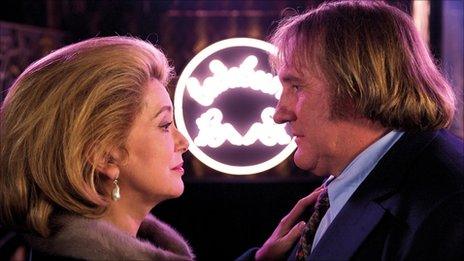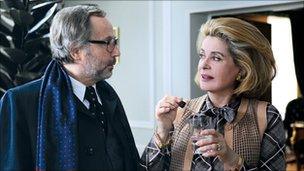How Catherine Deneuve became a trophy wife
- Published

Potiche reunites Catherine Deneuve and Gerard Depardieu - two of French cinema' s biggest stars
With more than 100 films to her name, screen icon Catherine Deneuve plays against type as a 1970s housewife in French sex comedy Potiche.
So often regarded as the embodiment of cinematic elegance, it is something of a surprise when Catherine Deneuve appears at the start of her latest film jogging in red tracksuit with her hair in curlers.
It might be described as Hilda Ogden chic.
"It's not an image of me you see on screen very often," says Catherine Deneuve, when we meet in London a day ahead of the film's UK opening. "It was my proposal to use the rollers for the jogging scene!"
In Potiche, Deneuve is Suzanne Pujol - the submissive wife of umbrella factory owner Robert Pujol (Fabrice Luchini) who runs his business empire with an iron fist.
'Eye candy'
But when the workers go on strike and Robert ends up in hospital, it is Suzanne who steps in to manage the factory.
In French, a potiche is a vase or useless decorative object. It is also a derogatory term for a woman who is considered a piece of "eye candy" on the arm of her husband.

In Potiche, Catherine Deneuve's character outwits her industrialist husband (Fabrice Luchini)
Director Francois Ozon based his film on a French farce of the same name. He says the story - set in 1977 - has many parallels with modern politics and society.
"There are more women running businesses or running for office now, but many of the problems and attitudes they face haven't changed much in 30 years."
In the film's bizarre opening scene, Deneuve converses with woodland creatures, scribbles a poem in notebook and then comes across a pair of mating rabbits.
"It's impossible to imagine Catherine Deneuve as a potiche so I needed to "kill" the image of Catherine Deneuve at the beginning," explains Ozon.
"It's a problem when you have a big star, we have to make the audience forget all those previous roles."
Deneuve's long career goes back to the 1950s, but it was in a string of 1960s films that she made her name: musical Les Parapluies de Cherbourg, Roman Polanski's Repulsion and Luis Bunuel's Belle de Jour.
'Quite sad'
One of her most high profile films in the 1980s was Tony Scott's vampire film The Hunger in which she starred alongside Susan Sarandon and David Bowie.
She received a best actress Oscar nomination in 1993 for Indochine.
"The film industry today is very much a business thing," Deneuve reflects.
"I remember when you were a young actor you would ask the day after a film opened: 'How were the reviews?' But today people only ask: 'How much did the film make?' It's quite sad."
If Deneuve's character in Potiche begins as caricature, she ends it as a serious political player.
She is reunited on screen with Gerard Depardieu for the first time since 2004's Changing Times.
Depardieu plays Suzanne's old flame - now a socialist mayor - against whom she stands at election time.
"I don't see him very often," says Deneuve of her co-star, "but when I do, it's always as if we'd been together just the week before."
Has Deneuve, I wonder, ever been tempted to go into politics?
"No never"," she says. "I am an actress, not a politician. I'm more involved in social issues than politics."
The film's centrepiece is a dance sequence with Deneuve and Depardieu in a nightclub.
For Ozon the scene was about celebrating their "magical" screen chemistry.
"It's intentionally artificial - they look into the camera. It's a moment out of time. They are the quintessential French couple."
With its Saturday Night Fever vibe, the dance scene firmly anchors the film into its 1970s setting.
Did Ozon ever think about transplanting the action to the present?
"No," he laughs, "I thought that if I set the film today it would have been a Ken Loach movie, not a comedy."
Potiche is out in selected cinemas around the the UK now.